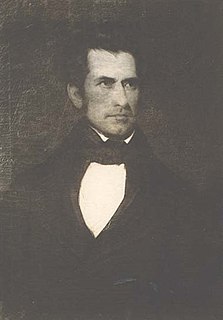Related Research Articles

An associate justice of the Supreme Court of the United States is any member of the Supreme Court of the United States other than the chief justice of the United States. The number of associate justices is eight, as set by the Judiciary Act of 1869.

Horace Harmon Lurton was an Associate Justice of the Supreme Court of the United States and previously was a United States circuit judge of the United States Court of Appeals for the Sixth Circuit and of the United States Circuit Courts for the Sixth Circuit.

The United States District Court for the Western District of Tennessee is the federal district court covering the western part of the state of Tennessee. Appeals from the Western District of Tennessee are taken to the United States Court of Appeals for the Sixth Circuit.

John Shelton Wilder was an American politician who was the 48th Lieutenant Governor of Tennessee for 36 years from January 1971 to January 2007, possibly the longest time anyone has served as Lieutenant Governor or a similar position in the history of the United States. He was a Tennessee state senator from 1959 to 1961 and again from 1967 to 2009. Tennesseans do not elect their lieutenant governor; rather, the Speaker of the Senate, who is first in the line of succession to the governor, is granted the title by statute.

The demographics of the Supreme Court of the United States encompass the gender, ethnicity, and religious, geographic, and economic backgrounds of the 116 people who have been appointed and confirmed as justices to the Supreme Court. Some of these characteristics have been raised as an issue since the court was established in 1789. For its first 180 years, justices were almost always white male Protestants of Anglo or Northwestern European descent.

Frank F. Drowota III was a former chief justice of the Tennessee Supreme Court.

Cornelia Anne Clark was an American attorney and jurist who served as a justice of the Tennessee Supreme Court from 2005 until her death in 2021.
Harry Walker Wellford was a Senior United States circuit judge of the United States Court of Appeals for the Sixth Circuit and a United States district judge of the United States District Court for the Western District of Tennessee.
President Richard Nixon entered office in 1969 with Chief Justice Earl Warren having announced his retirement from the Supreme Court of the United States the previous year. Nixon appointed Warren E. Burger to replace Earl Warren, and during his time in office appointed three other members of the Supreme Court: Associate Justices Harry Blackmun, Lewis F. Powell, and William Rehnquist. Nixon also nominated Clement Haynsworth and G. Harrold Carswell for the vacancy that was ultimately filled by Blackmun, but the nominations were rejected by the United States Senate. Nixon's failed Supreme Court nominations were the first since Herbert Hoover's nomination of John J. Parker was rejected by the Senate.

Morgan Welles Brown was a United States district judge of the United States District Court for the Eastern District of Tennessee, the United States District Court for the Middle District of Tennessee and the United States District Court for the Western District of Tennessee.

Ketanji Onyika Brown Jackson is an American jurist who serves as an associate justice of the Supreme Court of the United States. Jackson was nominated to the Supreme Court by President Joe Biden on February 25, 2022. She was confirmed by the United States Senate on April 7, 2022, and sworn into office on June 30. She was previously a United States circuit judge of the United States Court of Appeals for the District of Columbia Circuit from 2021 to 2022.
William H. D. Fones was an American jurist who served on the state supreme court of Tennessee.

One justice of the seven-member North Carolina Supreme Court and five judges of the 15-member North Carolina Court of Appeals were elected by North Carolina voters on November 8, 2016, concurrently with other state elections. Terms for seats on each court are eight years.
Allison B. Humphreys was a justice of the Tennessee Supreme Court from 1967 to 1974.
Roger A. Page is an American lawyer and judge who is the chief justice of the Tennessee Supreme Court. He was appointed to the court by Governor Bill Haslam.
Raymond Elmer Peters was an Associate Justice of the Supreme Court of California from March 26, 1959 to January 2, 1973.
David K. Overstreet is a justice of the Illinois Supreme Court.

With the advice and consent of the United States Senate, the president of the United States appoints the members of the Supreme Court of the United States, which is the highest court of the federal judiciary of the United States. Following his victory in the 2020 presidential election, Democrat Joe Biden took office as president on January 20, 2021. During the 2020 Democratic primary campaign, Biden pledged to appoint a Black woman to the Supreme Court, although unlike his opponent, Donald Trump, Biden did not release a specific list of potential nominees during the 2020 general election campaign.
References
- 1 2 3 4 5 6 Tennessee Supreme Court Historical Society. "Justices".
- 1 2 3 4 5 "Memphian to Be Named To State Supreme Court", The Memphis Press-Scimitar (June 13, 1980), p. 13.
- ↑ "Lawmaker Challenges Appointment to Court", The Knoxville News-Sentinel (June 14, 1980), p. 7.
- ↑ "Brown Dons Judge Robes", The Clarksville Leaf-Chronicle (June 23, 1980), p. 4.
- ↑ "Brown To Be Sworn In Today", The Clarksville Leaf-Chronicle (June 24, 1980), p. 7.
- ↑ Jim Balentine, "Judge Brown Backs Selection System", The Memphis Press-Scimitar (August 27, 1980), p. 25.
- ↑ "Drowota sworn in as justice", Johnson City Press (September 6, 1980), p. 7.